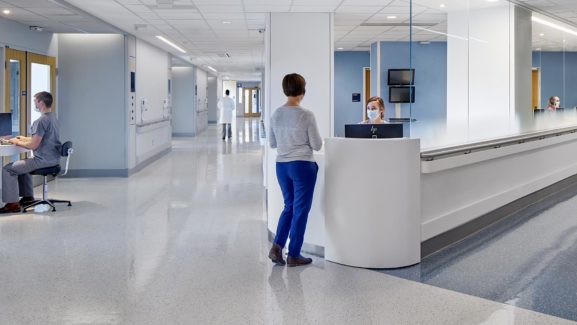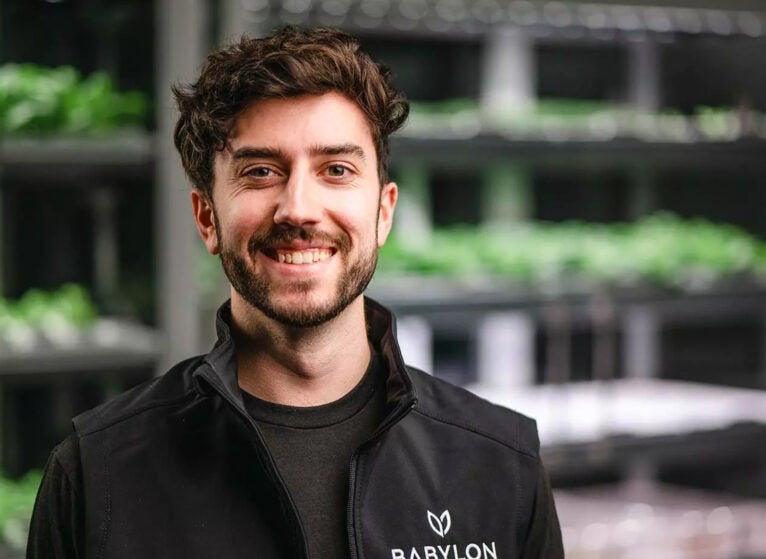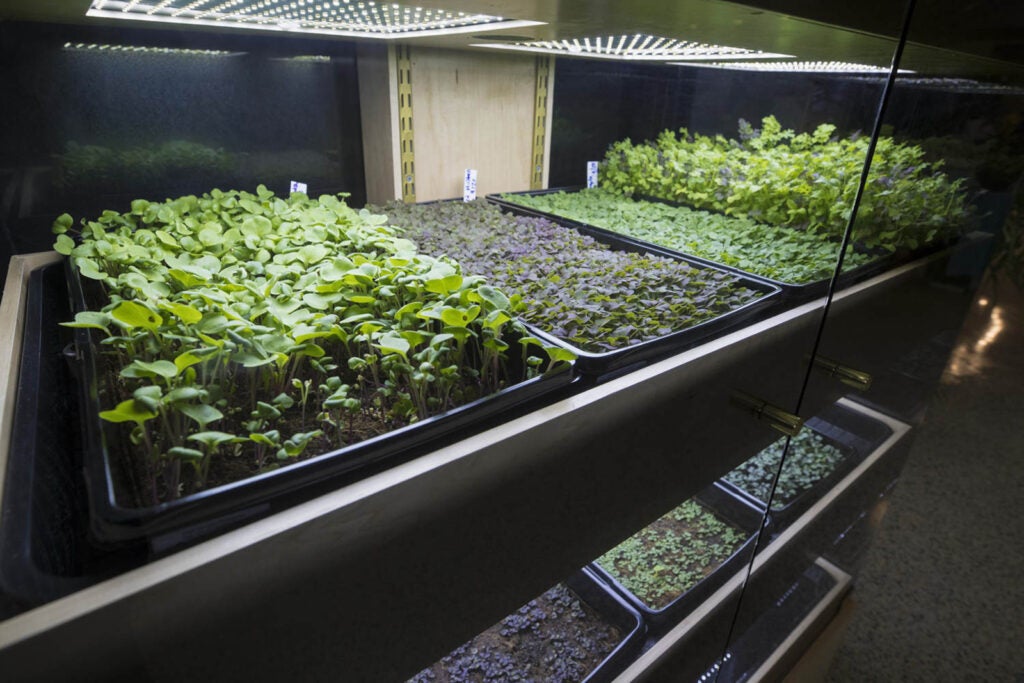

Co-founder of Babylon Micro-Farms and biomedical engineering alumnus Graham Smith stands in front of the mini produce gardens he helped develop. (Contributed photo)
Grown From UVA, Babylon Micro-Farms is Thriving, Including as a Model for Aspiring Engineers
When Graham Smith arrived at the University of Virginia as a first-year student, well before he and a classmate launched a now-thriving hydroponic farming start-up, he had to figure out what type of engineer to be.
He knew he had a taste for business. Years before, at the advanced age of 12, he’d faced a busted X-Box video game system and a related conundrum: wait until Christmas and ask his parents for a new one, or try to fix it himself?
“Instead of chucking it, I got on search and tried to figure out how to fix it,” he recalled. “It turned out to be surprisingly doable.”
That acumen with consumer electronics grew into an official business during his teenage years. Graham started a website and began fixing phones and devices for family, friends, and people online. By the time he entered UVA’s School of Engineering and Applied Science, he was looking for something else.
“I thought it would be more interesting to work on something that would make people’s lives healthier, happier and better, instead of just focusing on consumer electronics,” Smith said. “I thought that some of the ways I could do that were through working in education, food access or medical access. So that’s how I got into biomedical engineering. I thought that working on prosthetics in particular would be interesting work, and imagined how much someone’s life could be improved to gain or re-gain an ability to use their feet, hands or eyes.”
While studying biomedical engineering, Graham was building a few medical devices alongside UVA physicians and local startups, but was always on the lookout for new, interesting projects or people with which to work. That path led him to meet UVA classmate Alexander Olesen and the duo together founded Babylon Micro-Farms, a Richmond-based company that helps companies grow produce hydroponically on-site, often right in their cafeteria.
The company started in 2017, the year before Smith graduated from the Engineering School. Babylon Farms originally aimed to use hydroponics — a method where plants are grown entirely in water, with a much smaller physical footprint — as a lower-cost, rapidly deployable way to feed refugees facing food insecurity.
For Smith, who described himself as a “tinkerer” and as an engineering generalist, the decision to pursue the start-up was perfect.
“Being a biomedical engineer can prepare you a little bit for a lot of things,” he said. “If I’d wanted to go on to work on prosthetics or something like that, I’d have needed to develop a different and more specialized skill set. But the Engineering School offers enough in the liberal arts and other areas that I could have broad interests. Being well-rounded works extremely well in entrepreneurship.”
The new start-up initially operated out of the iLab incubator at UVA’s Darden School of Business, before growing into an office in Charlottesville — just behind Bodo's Bagels on Preston Avenue — where they stayed for several years, employing staff and developing the business plan.
“Then we started scaling up pretty quickly at the end of our time in C-Ville,” Graham recalled. “We went from 10 to 30 people, then we moved to Richmond three years ago and have been sort of flat at 30 to 40 employees.”
As it grew, the company moved from ideation to commercialization and running the business. Looking for a more direct way to reach more people, Babylon Micro-Farms evolved its business model and developed a product: self-contained hydroponic growing facilities that a company can install and use right from their cafeteria.
“We modularized it,” Smith said. “We’ve iterated a few times to arrive at a stand-alone semi-automated on-site farm for businesses. Those iterations have made it much easier for the end user to use, and made it easier for us to build and remotely support. It’s brought down cost, and we’ve built quite a bit of tech into it so it isn’t as time-consuming for the people who maintain it.”
The result is that a diner might see the produce they’re about to eat actually growing in a cafeteria, or try new varieties that they normally wouldn’t have access to, the flavors often more pronounced because the ingredients are so fresh. The self-contained gardens also add green space to sometimes drab corporate eateries.
One of their first clients? The University of Virginia. As it grew, working with more partners, Babylon Micro-Farms also launched its STEM Garden to use hydroponics as an educational tool.
The growth has been the result of a lot of hard work, and Smith said his advice for engineering students who are interested in business is to nurture their own interests, even if it’s just by working on side-projects.
“It may not be realistic to tell everyone in school to go out and launch their own business, because you need structure, support and resources to do that,” he said. “But even if you’re about to leave school and get a more typical job for your field, continue to do your own projects on the side, because that can guide your next career move or it can be something you could build into a full-time career.”
Latest News





